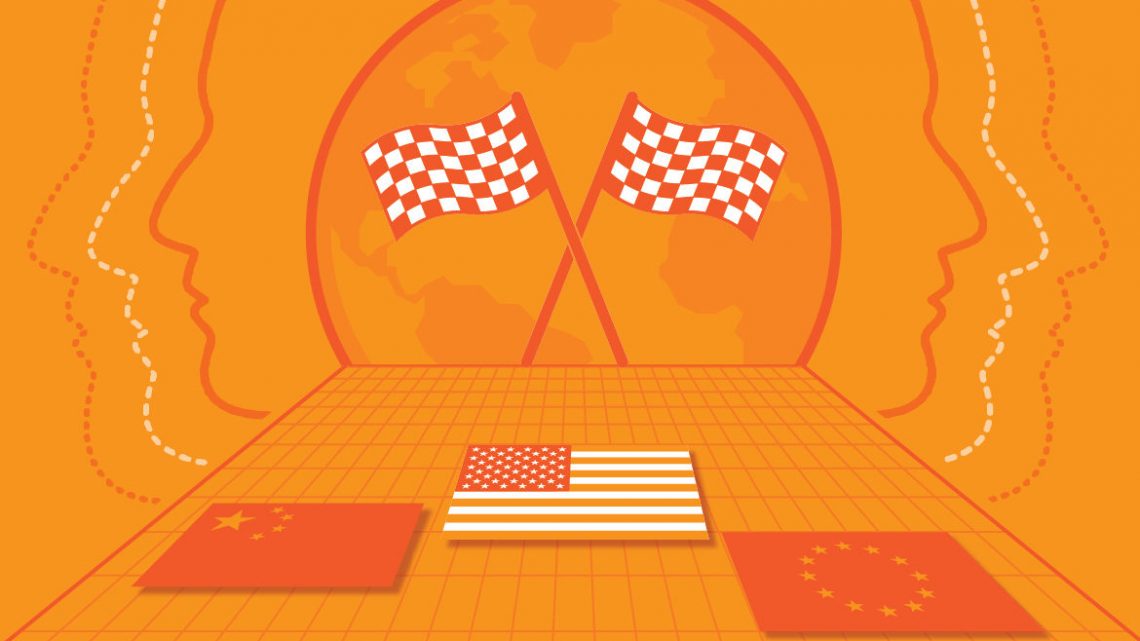
U.S. only just ahead of China in AI- technologies
27. Februar 2021U.S. only just ahead of China in AI- technologies
New York, 27.2.2021
In case the Chinese didn’t know it yet – now they even have it in writing: China is only one to two years behind the US in the development of AI technologies. This result was shared by former Google Chairman Eric Schmidt, who heads the U.S. government’s National Security Commission on Artificial Intelligence, in the middle of this week. The background to this is the commission’s report, which is due to be published on March 1. It apparently contains numerous statements that will make many an expert break out in a cold sweat.
It starts with Schmidt’s reference to the U.S. „ideally“ having a five- to ten-year lead over China in AI and other emerging technologies. Schmidt seems to doubt that this will ever be achieved, saying he is „concerned that we don’t understand the competitive threat from China,“ which includes semiconductor manufacturing, directed energy, 5G technologies and synthetic biology, as well as AI, machine learning and hypersonics.
What does „not understand?“ Schmidt is at pains to make this seem as figurative as possible: Software is given a low priority, he says. In doing so, he alludes to the kind of thinking error that German car managers also fell victim to. For years, Tesla was for them a tin can with an exploding battery that can only do 50 km and then has to be recharged for a day before it can go on. Meanwhile, Tesla’s manage up to 400 km (at least), there are enough charging stations and if it „squeaks“ somewhere, an engineer analyzes the vehicle remotely, e.g. from California, and eliminates the error by installing new software. Long waiting times, overpriced repairs – no longer necessary. The result: Tesla’s stock market value is several times higher than that of its competitors.
So it is obvious: The „hardware thinkers“ are from yesterday, that seems to be the majority. At least in the institution for which Schmidt wrote the report – the Pentagon. There, for example, there are procurement regulations that provide for a two-year delay. Much too long to be able to adapt and improve the software. In this way, a lot of money is wasted.
Schmidt explained the value of AI using the example of demining. Most of the time is spent observing, he said. Because human attention wanes, it makes more sense to leave that to software, he said, because „AI and machine learning are particularly good at observing.“
Brad Smith, president of Microsoft, said his biggest concern is the weakness and vulnerability of digital infrastructure in the commercial sector and outside the Department of Defense. He cited the collapse of the power grid in Texas and the failure of water systems after a severe winter weather event as examples. Smith noted that this was not a hostile cyberattack where „just code was sent“ or malware was planted with the goal of disruption, but the power grid collapse had the same impact. Smith emphasized that the oldest software and hardware tended to be found in the government sector. It is precisely this that is extremely vulnerable to collapse or disruption, he said.
Finally, Schmidt and Smith pointed to the vulnerability of critical components in the high-tech sector, noting that this is where the U.S. is highly dependent on Taiwan for semiconductors. While South Korea and Thailand – both allies – and Vietnam have increased semiconductor production, the U.S. would have to start „re-shoring“ this industry.


